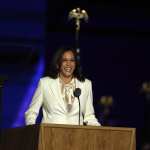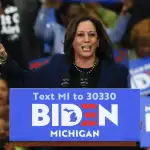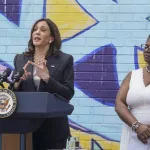This story was co-published with The Washington Post.
A year ago this week, Kamala D. Harris bounded onstage before a crowd of 22,000 in an Oakland park to declare her candidacy for president of the United States. The junior senator from California — already the most powerful Black woman in elected office in America — would become only the third Black woman in the country’s history to seek the Democratic Party’s nomination for the highest office in the land.
In an emotional speech, Harris introduced herself as the daughter of immigrants who came to this country as students and became civil rights activists, before launching into her own story as a prosecutor who sought to change the system from the inside. It was an origin story that sounded nothing like most of the presidential hopefuls who had come before her.
In just two years in the U.S. Senate, Harris has quickly distinguished herself as a lawmaker and litigator, taking on some of the administration’s most polarizing nominees, including attorneys general Jeff Sessions and William P. Barr, and Supreme Court Justice Brett M. Kavanaugh.
Harris felt duty-bound to run, she told the crowd.
“We are here knowing that we are at an inflection point in the history of our nation,” she said. “We are here because the American Dream and our democracy are under attack and on the line like never before. I stand before you today, clear-eyed about the fight ahead and what has to be done.”
A year later, the 55-year-old freshman senator is out of the race, dropping out in December after telling supporters there was no path forward for her candidacy, which was lagging behind in the polls and struggling to raise money. It was an outcome that shocked many, though some would say it was where she was destined to end up, given the country’s history and, perhaps, its present.
As with any unsuccessful campaign, the reasons for this are many, but neither money nor messaging nor momentum solely explain why a candidate seemingly as formidable as Harris is out before the first ballots have been cast. Dozens of her campaign staff, surrogates and supporters spoke to The 19th about how Harris’s race and gender contributed to her early exit, offering their perspectives in more depth and detail than previously reported.
Americans will start to vote next week on who the Democratic nominee will be. But missing from their list of choices will be not only Harris but also other high-profile candidates of color who helped make the Democrats’ field the most diverse in history, including Sen. Cory Booker of New Jersey and former HUD secretary Julián Castro. White men are three of the four front-runners in the race.
It’s not the expected state of play after the 2018 midterm elections, when several female candidates flipped House seats and governor’s mansions across the country, and a historic number of women and minorities were voted into Congress. Yet worry persists among many Trump-weary voters eager to oust the president over whether a woman can beat him in November, a doubt that could make the difference this fall in an election that will probably be won on the margins.
For presidential candidates, two central questions exist in the minds of the electorate: Who are you? Why are you running? With the exception of former vice president Joe Biden and Sen. Bernie Sanders (I-Vt)., who also ran in 2016, most of the 2020 hopefuls were largely unknown to much of the electorate when they joined the field.
Harris was already a known figure to many in the media, some of whom had already branded her the next Barack Obama, after the country’s first Black president. During Senate confirmation hearings, she grilled administration nominees, a move that earned her a reputation for “prosecuting” the president. But her background as a district attorney rankled others. Even before she entered the race, a scathing op-ed written by criminal justice restructuring advocate Lara Bazelon criticizing Harris’s record as a prosecutor ran in the New York Times — burnishing a negative impression of Harris in the minds of some criminal justice restructuring activists who have been critical of the role in the Black Lives Matter era.
“It created something for people who wanted to take her down a peg or ‘expose her.’ At the same time you’re trying to introduce yourself to the country, you’re facing a torrent of criticism based on short-handing her entire career and record, and that was tough,” said former Harris campaign national press secretary Ian Sams. “But it would be a mistake to say that doomed her candidacy; it did not.”
Initially, Harris also struggled to define herself — a challenge not uncommon to professional Black women who are more used to letting their work speak for them. Her humility was a detriment on the campaign trail, said surrogate Bakari Sellers.
“The way they were raised means that you don’t tell people about the good work that you’re doing,” said Sellers of Harris and her younger sister, Maya, who served as chief adviser on Harris’s campaign. “In the age of disinformation and social media, you have to be the one to tell people who you are. She never really went there.”
After appearing on “Good Morning America” on Martin Luther King Jr. Day to announce her candidacy, a move both strategic and symbolic, Harris headed to her alma mater, Howard University. A gaggle of political journalists — some of whom were setting foot on the historically Black college, or any HBCU, for that matter, for the first time — waited to talk to her.
Asked how she would describe herself as a woman of Black and Indian heritage, Harris laughed and answered, “I describe myself as a proud American.”
“We walked into this knowing that there was no playbook for a race like this, for a candidate like this,” said Iowa state director Deidre DeJear, who narrowly lost her bid to become the first Black woman elected statewide in her 2018 secretary of state race. “We had to be very, very careful about how we handled all types of situations, on the account that we did not want anything to interfere with progress, and we did not want anything to interfere with someone’s ability to connect with Kamala. It was like we were building a plane as we were flying it.”
One such lesson: Dancing with a drum line, an homage to her HBCU roots, was a win with some Black voters, but is hell on straightened Black hair.
“The humidity will get those curls poppin’!” DeJear said. “It’s something you just don’t think about if you are not a Black woman.”
Harris’s race became a flash point this summer, as she clashed with Joe Biden in the first Democratic presidential debate over his comments regarding working with segregationist senators.
“It’s personal and it’s hurtful to hear you talk about the reputations of two United States senators who built their career on the segregation of race in this country,” Harris said, turning to the former vice president and looking him in the eye. “It was not only that, but you also worked with them to oppose busing. There was a little girl in California who was part of the second class to integrate her public schools. And she was bused to school every day. And that little girl was me.”
The moment brought a boost in Harris’s poll numbers, but the senator had mixed results in her four debate appearances. “The debates were the moments where we had the most eyes,” said Kirsten Allen, former deputy communications director. “There are people who were just finding out who she was when she hit that first debate stage, despite having been in the race for five months. The debates were critical.”
With the new attention came fresh scrutiny. “There was always a ‘but,’ there was always a question,” said surrogate and Democratic Rep. Marcia L. Fudge of Ohio, one of seven members of the Congressional Black Caucus to endorse Harris, who led the field in CBC endorsements before dropping out. “We hold Black people and women to a different standard than we hold anyone else — even as Black people.”
Electability has become a buzzword that defines this primary cycle. In a fear election in which Democrats’ top priority is defeating the president, the electability candidate for Black voters — who hold the pathway to the Democratic nomination — has long appeared to be Biden, making it difficult for any of the would-be nominees, including the Black candidates, to break through this cycle.
“One of the questions she was always going to have to deal with uniquely was this question of electability,” said Harris former communications director Lily Adams, who also worked on Hillary Clinton’s 2016 campaign. “Can a Black woman win? Is the country ready? Not only did she have to convince people that as a woman she could win, but also as a Black woman. Every single day that Kamala Harris was a presidential candidate, she was challenging people to imagine things they had not seen. You are challenging not just the status quo or hundreds of years of history.”
The risk-averse nature of voters of color, in particular, hurt candidates such as Harris and, later, Booker and Castro.
“It’s harder to break through because unfairly there’s a perception that you’re riskier, because everybody thinks my White neighbor or my White cousin’s not going to elect a person of color or a woman against Trump,” Sams said. “The question of whether we’re ready for a Black woman or any historic first is inextricably tied to this question of risk that has been propped up by fear of Trump. It’s easier to imagine a world in which a historic candidate is the runaway winner against Jeb Bush, but that’s not the environment we’re in.”
Shirley Chisholm, who became the first Black woman to seek the presidential nomination of a major political party in 1972, said it was more difficult to be a woman than it was to be Black. Nearly 50 years later, Fudge said not much seems to have changed.
During the campaign, Harris would often play a game with the staff where she would ask them to close their eyes and imagine a four-word expression that encapsulates other people who have run for president. “The boy next door” was a popular answer.
“There is no four-word phrase that can capture Kamala Harris for people,” Adams said. “She doesn’t fit into any neat box.”
On the trail, Harris would often quote her mother, Shyamala, who would tell her as a young girl, “You may be the first to do something, but make sure you’re not the last.” In politics, people tend to want a frame of reference, an analog for who you are as a candidate: Bill Clinton benefited from John F. Kennedy’s candidacy a generation earlier. For Harris, there was no such lens. And as a pioneer, there was no room for error with legacy at stake.
For Black women, like their very existence, there are many layers to a path for victory, Allen said.
“We’re not allowed to fail and still be considered viable,” she said. “I don’t want it to ever get confused that it was too hard, or that she wasn’t up for the challenge, or that she didn’t know how to navigate the space. That’s been her space, and she’s risen to the top of those spaces.”
In her announcement speech, Harris offered the audience a disclaimer, telling them: “I am not perfect.”
“We know this is not going to be easy, and we know what the doubters will say,” she told the crowd. “They’ll say, ‘It’s not your time.’ They’ll say, ‘Wait your turn.’ They’ll say, ‘The odds are long.’ They’ll say ‘It can’t be done.’ But America’s story has always been written by people who can see what can be, unburdened by what has been.”
It remains to be seen when or who will be the next Black woman to try to make history, or whether the country will have to wait another generation for that candidate. Harris will certainly not be the last to attempt to hurdle the barrier.
“The more we get opportunities to run and help people understand that we are the least self-interested demographic that exists as Black women, the more people feel comfortable with us,” DeJear said. “When Black women lead, they take care of everybody. You just have to own your story, own your path, whatever it may look like, and present it in a way in which people can receive it.”
Having more Black female candidates step up to lead chips away at the barriers to victory, Sams said.
“It’s only going to happen by trying. I just hope the system reflects on itself to make candidates like her not feel like they can’t do this in the future, because they can, and they should.”







